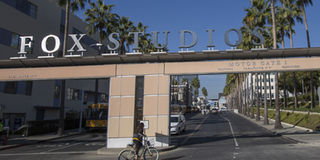Murdoch's leaner Fox machine post-Disney deal

A bicyclist rides through the main entrance to Fox Studios after the Walt Disney Company announced that it will acquire 21st Century Fox on December 14, 2017 in Los Angeles, California. AFP PHOTO
What you need to know:
- Murdoch, the son of an editor and senior newspaper executive, began his career by taking control of an Australian public corporation in 1954 whose only key asset at the time was a majority interest in a daily newspaper in the coastal town of Adelaide.
- The deal includes Twentieth Century Fox Film and Television studios, and cable and international TV businesses for $52.4 billion in stock, and is expected to result in a large number of layoffs.
Rupert Murdoch's decision to sell off the bulk of 21st Century Fox leaves him with a leaner, tighter media machine focused on broadcast news and sports, a drastic retrenchment after half a century of expansion.
The decision to sell off Hollywood film and television studios, cable entertainment networks and international TV assets effectively takes Fox out of the business of producing entertainment content, and makes it less invested in distribution.
So what is the Australian-born billionaire left with and why did he enter into the $52.4 billion deal with Walt Disney Co.? Essentially Fox will be left with three key assets -- Fox Broadcasting, Fox News and cable channels Fox Sports 1 and 2.
"We are excited by the possibilities of the new Fox," said Murdoch in a statement. "It is born out of an important lesson I've learned in my long career in media: namely, content and news relevant to viewers will always be valuable."
Fox News is the most watched cable news network in the United States despite explosive harassment scandals and an increasingly toxic reputation among liberal Americans bitterly opposed to President Donald Trump.
It also remains the most profitable arm of the Fox empire. Murdoch stepped in personally to lead Fox News after its late founding chairman, Roger Ailes, left in a blaze of sexual harassment allegations in July 2016.
The job has given the 86-year-old media tycoon, who has long curried political influence in Australia and Britain, direct access to Trump.
Fox Business is currently America's number one business network and Fox Broadcasting Company is watched by nearly 100 million households every month. Fox Sports retains the rights to the NFL, MLB, World Cup soccer and US Open, among other tournaments.
Prior to the Disney deal going through, 21st Century Fox now intends to unite these assets into a newly listed Fox company, which will also include the Big Ten Network.

Rupert Murdoch, founder and head, New Corporation
So why now?
The industry is undergoing drastic change. The emergence of new streaming giants such as Amazon and Netflix has revolutionized how people consume entertainment on television. No longer held hostage to network schedules, they can watch when and how they want, bypassing ad breaks into the bargain.
"There are a lot of change coming," Murdoch told Fox Business on Thursday.
'Strategic realignment'
"Not news or business, but entertainment they watch very differently," he said.
"We see that in the way people watch the broadcast networks. There's no loyalty to them, there's loyalty to individual programs," he said. "It's very hard to monetize that with advertising."
Analysts believe the focus on news and sports may make Fox less vulnerable to declining ratings for scripted and reality entertainment.
"News and sports are generating the bulk of their profit," said Tuna Amobi, director and senior equity analyst at the investment research firm CFRA Research.
"It's a very calculated strategic portfolio realignment that Fox is doing to reposition their assets in a very shifting competitive landscape."
But it is still a stunning about-turn for an octogenarian whose entire career to date has been marked by ruthless expansion in Australia, Britain and the United States.
Murdoch, the son of an editor and senior newspaper executive, began his career by taking control of an Australian public corporation in 1954 whose only key asset at the time was a majority interest in a daily newspaper in the coastal town of Adelaide.
The Disney deal will see no change to the publishing side of his empire, which owns newspapers in Australia, Britain and the United States, including the New York Post and Wall Street Journal, as well as Dow Jones and Company.
It could also set the scene for a merger between what remains of Fox and News Corporation, the publishing arm of Murdoch's empire.
"I wouldn't rule that out," Amobi said.
It may also settle the futures of Murdoch's sons, potentially giving Lachlan a clear succession at Fox, while James, as chief executive officer of 21st Century Fox, could now oversee the absorption into Disney.
"We're honored and grateful that Rupert Murdoch has entrusted us with the future of businesses he spent a lifetime building," said Disney chairman and CEO Robert Iger.


